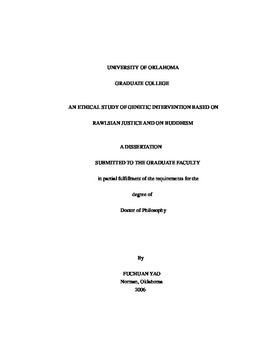| dc.contributor.advisor | Sankowski, Edward, | en_US |
| dc.contributor.author | Yao, Fuchuan. | en_US |
| dc.date.accessioned | 2013-08-16T12:20:21Z | |
| dc.date.available | 2013-08-16T12:20:21Z | |
| dc.date.issued | 2006 | en_US |
| dc.identifier.uri | https://hdl.handle.net/11244/1082 | |
| dc.description.abstract | The primary purpose of my dissertation is to discuss the moral distinction between genetics based medical therapy and enhancement, using a combination of ethical ideas derived from Rawlsian justice and from Buddhism. | en_US |
| dc.description.abstract | In general, this dissertation takes up basic issues in medical ethics, in moral philosophy generally, and in social and political philosophy, including the following areas: the limitations of a Rawlsian justice centered approach, the value of a Buddhist approach centered on compassion and questioning of craving, worries about the distribution of treatment of disease and worries about eugenics, cross-cultural, religious, and global or international aspects of health care policy, and the role of science in health care policy. | en_US |
| dc.description.abstract | Second, I offer a Buddhist approach in examining the ethics of the arbitrariness problem. Buddhists argue that therapeutic intervention based on Bodhisattva's compassion is obligatory and pure enhancement based on human "craving" is morally possibly justifiable in some cases but is not justifiable in other cases. Hence, there is a morally significant distinction between genetics based medical interventions that are therapeutic and that are enhancements, from one Buddhist perspective. | en_US |
| dc.description.abstract | I first analyze the Rawlsian approach to a "moral arbitrariness" problem. Buchanan and his collaborators argue that there is a moral distinction between therapy and enhancement but that it is in a sense arbitrary (in the sense that I use that word). French Anderson and others contend that there is a morally significant line. | en_US |
| dc.description.abstract | Finally, I offer my approach: therapeutic intervention based on Bodhisattva's compassion is obligatory and pure enhancement based on justice as fair equal opportunity could be permissible or impermissible. The aims of my approach are to maintain the moral distinction that Buddhists discern and to resolve certain weaknesses of the Buddhist approach. | en_US |
| dc.format.extent | vi, 260 leaves : | en_US |
| dc.subject | Human genetics Moral and ethical aspects. | en_US |
| dc.subject | Bioethics. | en_US |
| dc.subject | Medicine Religious aspects. | en_US |
| dc.subject | Genetics Research Moral and ethical aspects. | en_US |
| dc.subject | Medical ethics. | en_US |
| dc.subject | Medicine Philosophy. | en_US |
| dc.subject | Health Sciences, Medicine and Surgery. | en_US |
| dc.subject | Philosophy. | en_US |
| dc.title | An ethical study of genetic intervention based on Rawlsian justice and on Buddhism. | en_US |
| dc.type | Thesis | en_US |
| dc.thesis.degree | Ph.D. | en_US |
| dc.thesis.degreeDiscipline | Department of Philosophy | en_US |
| dc.note | Source: Dissertation Abstracts International, Volume: 67-08, Section: A, page: 3014. | en_US |
| dc.note | Adviser: Edward Sankowski. | en_US |
| ou.identifier | (UMI)AAI3230198 | en_US |
| ou.group | College of Arts and Sciences::Department of Philosophy | |
